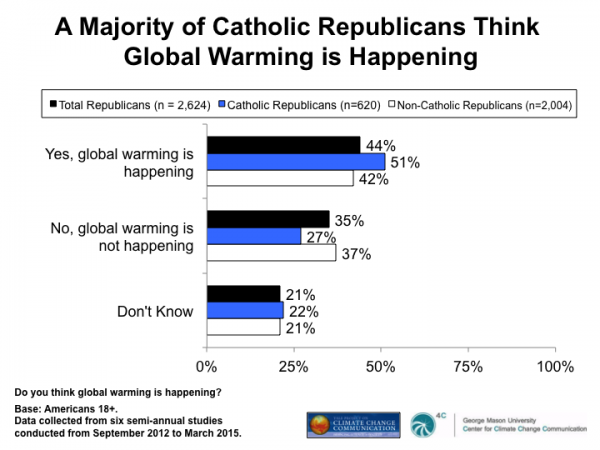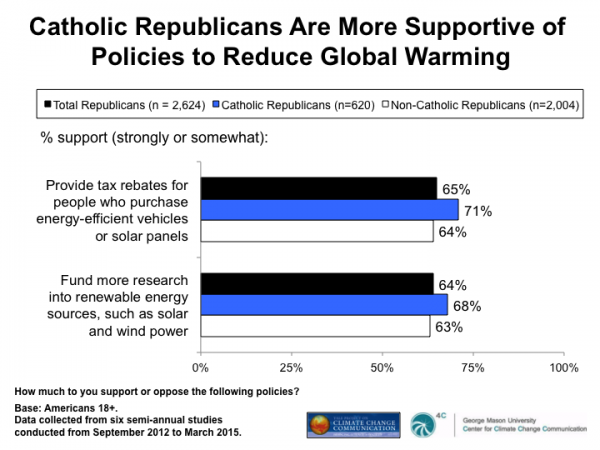Climate Note · Jun 18, 2015
Among Republicans, Catholics More Likely to Believe that Global Warming is Happening and Support Policies to Reduce It
Filed under: Policy & Politics
On June 18th, Pope Francis released a much-anticipated encyclical—one of the most significant forms of communication within the Catholic Church—on climate change. In September, the Pope will visit the United States, where one in four Americans are Catholic, and address the Republican-controlled U.S. Congress at the invitation of House Speaker John Boehner (R-OH).
Our research has shown that, in general, Republicans are less convinced that human-caused global warming is happening and less supportive of climate and clean energy policies than are Democrats. We have also found that American Catholics are more likely than other American Christians to believe global warming is happening and to be worried about it.
In this Climate Note we investigate whether or not there are differences in global warming beliefs, attitudes, and policy preferences between Catholic and non-Catholic Republicans.
Overall, we find that Catholic Republicans are more convinced that global warming is happening and human-caused, and are more worried and supportive of climate policies, than are non-Catholic Republicans. These differences between Catholics and non-Catholics are unique to Republicans; that is, we see far fewer differences between Catholic and non-Catholic Democrats and Independents on these issues.
A Majority of Catholic Republicans Think Global Warming Is Happening and Is Caused Mostly By Human Activities
A majority of Catholic Republicans in the U.S. thinks that global warming is happening (51%), compared to a minority of non-Catholic Republicans (42%).
Further, 36% of Catholic Republicans say global warming is caused mostly by human activities, compared to only 30% of non-Catholic Republicans.
Catholic Republicans Are More Worried About Global Warming
Catholic Republicans are also more worried about global warming than other Republicans—36% say they are somewhat or very worried about global warming, while fewer non-Catholic Republicans are worried (30%).
Catholic Republicans Are More Likely Than Non-Catholic Republicans to Understand Most Scientists Think Global Warming Is Happening
Though nearly all climate scientists (97%) are convinced that human-caused global warming is happening (1), we find that among Republicans, Catholics (30%) are more likely than non-Catholics (25%) to know that most scientists agree global warming is happening.
Catholic Republicans Are More Supportive of Policies to Reduce Global Warming
Among Republicans, Catholics also express greater support for a variety of policies that would help reduce global warming than do non-Catholics, such as providing tax rebates to people who purchase energy-efficient vehicles or solar panels (71% versus 64% of non-Catholic Republicans) and for funding more research into renewable energy sources (68% versus 63% of non-Catholic Republicans).
Catholic Conservative Republicans Are More Likely Than Non-Catholic Conservative Republicans to Think Global Warming Is Happening and to Be Worried About It
Are Catholic Republicans more concerned than non-Catholic Republicans about global warming simply because Catholic Republicans are more politically moderate? It is true that Catholic Republicans are less conservative—a smaller percentage of Catholic Republicans self-identify as “conservative” (59%) than do non-Catholic Republicans (69%). Still, even among conservative Republicans, more Catholics than non-Catholics express concern about global warming. For example, Catholic conservative Republicans are more likely than non-Catholic conservative Republicans to think that global warming is happening (42% versus 35%, respectively).
Moreover, Catholic conservative Republicans are also more likely than non-Catholic conservative Republicans to say they are somewhat or very worried about global warming (28% vs. 21%, respectively). Interestingly, Catholic moderate/liberal Republicans are no more worried about global warming than non-Catholic moderate/liberal Republicans (48% vs. 47% respectively).
This Climate Note is by Zena Grecni
Survey Method
These findings combine data from six nationally representative surveys of American adults conducted between Fall, 2012, and Spring, 2015. All surveys were directed by the Yale Project on Climate Change Communication and the George Mason University Center for Climate Change Communication. Results from each of the six surveys were weighted equally to adjust for differences in sample size among the surveys.
The samples were drawn from GfK’s KnowledgePanel®, an online panel of members drawn using probability sampling methods. Prospective members are recruited using a combination of random digit dial and address-based sampling techniques that cover virtually all (non-institutional) resident phone numbers and addresses in the United States. Those contacted who would choose to join the panel but do not have access to the Internet are loaned computers and given Internet access so they may participate.
The sample therefore includes a representative cross-section of American adults irrespective of whether they have Internet access, use only a cell phone, etc. Key demographic variables were weighted, post survey, to match US Census Bureau norms.
The survey instruments were designed by Anthony Leiserowitz, Geoff Feinberg, and Seth Rosenthal of Yale University, and Edward Maibach and Connie Roser-Renouf of George Mason University.
Survey Field Dates and Number of Respondents
- February 27 – March 10, 2015; 1,263 American adults
- October 17 – 28, 2014; 1,275 American adults
- April 15 – 23, 2014; 1,384 American adults
- November 23 – December 9, 2013; 830 American adults
- April 8 – 15, 2013; 1,045 American adults
- August 31 – September 12, 2012; 1,061 American adults
Sample Sizes and Margins of Error
All samples are subject to some degree of sampling error—that is, statistical results obtained from a sample can be expected to differ somewhat from results that would be obtained if every member of the target population was interviewed. Average margins of error, at the 95% confidence level, are as follows:
- Total Republicans = 2,624, +/- 2 percentage points
- Catholic Republicans = 620, +/- 4 percentage points
- Non-Catholic Republicans = 2,004, +/- 2 percentage points
- Conservative Republicans = 1,807, +/- 2 percentage points
- Catholic conservative Republicans = 392, +/- 5 percentage points
- Non-Catholic conservative Republicans = 1,415, +/- 3 percentage points
Rounding Error
For tabulation purposes, percentage points are rounded off to the nearest whole number. As a result, percentages in a given chart may total slightly higher or lower than 100%.
_________________________________
1. Cook, J., Nuccitelli, D., Green, S.A., Richardson, M., Windler, B., Painting, R., Way, R., Jacobs, P., & Skuce, A. (2013). Quantifying the consensus on anthropogenic glboal warming in the scientific literature. Environmental Research Letters, 8.


